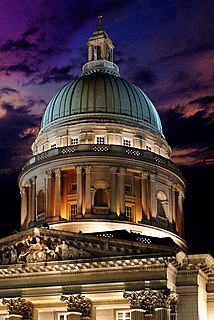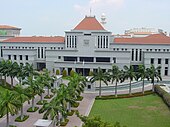
A pawnbroker is an individual or business that offers secured loans to people, with items of personal property used as collateral. The items having been pawned to the broker are themselves called pledges or pawns, or simply the collateral. While many items can be pawned, pawnshops typically accept jewelry, musical instruments, home audio equipment, computers, video game systems, coins, gold, silver, televisions, cameras, power tools, firearms, and other relatively valuable items as collateral.

Singapore, officially the Republic of Singapore, is a sovereign island city-state in maritime Southeast Asia. It lies about one degree of latitude north of the equator, off the southern tip of the Malay Peninsula, bordering the Straits of Malacca to the west, the Riau Islands to the south, and the South China Sea to the east. The country's territory is composed of one main island, 63 satellite islands and islets, and one outlying islet, the combined area of which has increased by 25% since the country's independence as a result of extensive land reclamation projects. It has the second greatest population density in the world. The country is home to almost 5.7 million residents, 61% (3.4 million) of whom are Singaporean citizens. There are four official languages of Singapore: English, Malay, Chinese, and Tamil; with English being the lingua franca. This reflects in its rich cultural diversity and extensive ethnic cuisine and major festivals. Multiracialism is enshrined in the constitution, and continues to shape national policies in education, housing, and politics.
A transaction account, also called a checking account, chequing account, current account, demand deposit account, or share draft account at credit unions, is a deposit account held at a bank or other financial institution. It is available to the account owner "on demand" and is available for frequent and immediate access by the account owner or to others as the account owner may direct. Access may be in a variety of ways, such as cash withdrawals, use of debit cards, cheques (checks) and electronic transfer. In economic terms, the funds held in a transaction account are regarded as liquid funds. In accounting terms they are considered as cash.

The legal system of Singapore is based on the English common law system. Major areas of law – particularly administrative law, contract law, equity and trust law, property law and tort law – are largely judge-made, though certain aspects have now been modified to some extent by statutes. However, other areas of law, such as criminal law, company law and family law, are almost completely statutory in nature.

The Government of the Republic of Singapore is defined by the Constitution of the Republic of Singapore to mean the Executive branch of government, which is made up of the President and the Cabinet of Singapore. Although the President acts in his/her personal discretion in the exercise of certain functions as a check on the Cabinet and Parliament of Singapore, his/her role is largely ceremonial. It is the Cabinet, composed of the Prime Minister and other Ministers appointed on his/her advice by the President, that generally directs and controls the Government. The Cabinet is formed by the political party that gains a simple majority in each general election.

The Cabinet of Singapore forms the Government of Singapore together with the President of Singapore. It is led by the Prime Minister of Singapore who is the head of government. The Prime Minister is a Member of Parliament (MP) appointed by the President who selects a person that in his or her view is likely to command the confidence of a majority of the Parliament of Singapore. The other members of the Cabinet are Ministers who are Members of Parliament appointed by the President on the Prime Minister's advice. Cabinet members are prohibited from holding any office of profit and from actively engaging in any commercial enterprise.

A Non-constituency Member of Parliament (NCMP) is a member of a Singaporean opposition political party who, according to the Constitution and Parliamentary Elections Act, is declared to have been elected a Member of the Parliament of Singapore without constituency representation, despite having lost in a general election, by virtue of having been one of the best-performing losers. The number of NCMPs is 12 less the number of opposition Members of Parliament ("MPs") elected. NCMPs enjoy all of the privileges of ordinary Members of Parliament.

The Parliament of the Republic of Singapore and the President jointly make up the legislature of Singapore. Largely based from the Westminster system, the Parliament is unicameral and is made up of Members of Parliament (MPs) who are elected, as well as Non-constituency Members of Parliament (NCMPs) and Nominated Members of Parliament (NMPs) who are appointed. Following the 2020 general election, 93 MPs and two NCMPs were elected to the 14th Parliament. Nine NMPs will usually be appointed.

A fence, also known as a receiver, mover, or moving man, is an individual who knowingly buys stolen goods in order to later resell them for profit. The fence acts as a middleman between thieves and the eventual buyers of stolen goods who may not be aware that the goods are stolen. As a verb, the word describes the behaviour of the thief in the transaction: The burglar fenced the stolen radio. This sense of the term came from thieves' slang, first attested c. 1700, from the notion of such transactions providing a defence against being caught. The term remains in common use in all major dialects of modern English, all of which spell it with a "c" even though the source word in some dialects is now spelled defense.
Section 377A is a Singaporean law criminalising sex between consenting male adults. The item of legislation was added to the Penal Code in the 1930s. The item remained part of the Singapore body of law after the Penal Code review of October 2007 that removed most of the other provisions in Section 377. The section is entitled Outrages on decency and reads:
Any male person who, in public or private, commits, or abets the commission of, or procures or attempts to procure the commission by any male person of, any act of gross indecency with another male person, shall be punished with imprisonment for a term which may extend to 2 years.

POSB Bank is a Singaporean bank offering consumer banking services and is the oldest local bank in continuous operation in Singapore. Established on 1 January 1877 as the Post Office Savings Bank, the bank now operates as part of DBS Bank, which acquired the institution and its subsidiaries on 16 November 1998.

Human rights in Singapore are codified in the Constitution of Singapore, which complies the legal rights of its citizens. These rights are protected by the Constitution and include amendments and referendums. These rights have evolved significantly from the days since independence though the government in Singapore has broad powers to possibly limit citizens' rights or to inhibit political opposition. In 2018, Singapore was ranked 151st by Reporters Without Borders in the Worldwide Press Freedom Index. U.S.-based Freedom in the World scored Singapore 3 out of 7 for "political freedom", and 3 out of 7 for "civil liberties", with an overall ranking of "partly free" for the year 2015.

Pawnbroking, lending money on portable security, began in ancient history. The practice was widespread in many parts of the world, from ancient Greece to medieval China and medieval Europe.
Taxes in India are levied by the Central Government and the state governments. Some minor taxes are also levied by the local authorities such as the Municipality.

Halimah binti Yacob is a Singaporean politician serving as President of Singapore since 2017. Previously a member of the governing People's Action Party (PAP), she was a Member of Parliament (MP) for Jurong GRC from 2001 to 2015 and for Marsiling–Yew Tee GRC (Marsiling) from 2015 to 2017. She was the 9th Speaker of the Parliament of Singapore from 2013 to 2017, which she resigned to participate in the 2017 Singapore presidential election. Halimah won in an uncontested election, as no other presidential candidate was issued the Certificate of Eligibility. She was sworn in the following day becoming the first female president in the country's history and the second Muslim since Yusof Ishak in 1965.

Ong Ye Kung is a Singaporean politician who has served as the Minister for Transport since 27 July 2020. He also served as the Minister of Education from 1 October 2015 to 26 July 2020. From 1 October 2015 to 30 April 2018, he served alongside Ng Chee Meng. He was in charge of Higher Education and Skills while Ng Chee Meng was in charge of Schools. On 1 May 2018, the position was merged again into a single ministerial portfolio. He has also been the Member of Parliament (MP) for Sembawang Central ward in the Sembawang GRC since 11 September 2015.

The Insolvency & Public Trustee's Office (IPTO) in Singapore is a department under the Ministry of Law. IPTO oversees the administration of individual and corporate insolvencies, the administration of small intestate estates and un-nominated Central Provident Fund (CPF) monies, as well as the licensing and regulation of moneylenders and pawnbrokers.
Yossi Dina is an Israeli pawnbroker, businessman, entrepreneur, and reality television personality.

The 2020 Singaporean general election was a general election held in Singapore on 10 July 2020. It elected members of parliament to the 14th Parliament of Singapore since Singapore's independence in 1965, using the first-past-the-post electoral system. Voting was mandatory for all Singaporeans who were aged 21 or above as of 1 March 2020.
The 1Malaysia Development Berhad scandal is an ongoing political scandal occurring in Malaysia. In 2015, Malaysia's then-Prime Minister Najib Razak was accused of channelling over RM 2.67 billion from 1Malaysia Development Berhad (1MDB), a government-run strategic development company, to his personal bank accounts. The event triggered widespread criticism among Malaysians, with many calling for Najib Razak's resignation – including Mahathir Mohamad, one of Najib's predecessors as prime minister, who later defeated Najib in the 2018 general election and returned to power.













